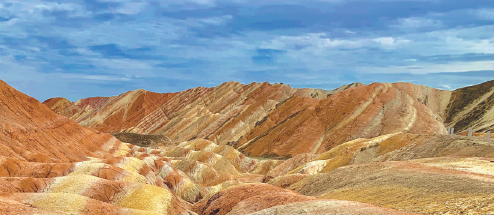Rocky rainbows' cultural colors
By Erik Nilsson (CHINA DAILY) Updated: 2019-12-03 00:00Gansu province's Rainbow Mountains live up to their colorful name-and the various names that live within them.
That's not only because the 50-square-kilometer range in the Qilian Mountains' foothills on the edge of Zhangye city takes its appellation from its multihued striations. (It's a trend to share photos of the peaks with the hashtag, "#nofilter".)
But also, its individual landforms have been imbued with colorful names tinted with culture, such as A Supernatural Tortoise Looking Up at the Sky, Small Potala Palace and Monks Worshiping Buddha.
That's not to mention the likes of Colorful Embroidery, Great Wall on the Precipice and Mazi Noodles Shop.
Indeed, geology and anthropology mix to paint the Rainbow Mountains with a vibrant allure that comes alive as a cast of characters and symbols from Chinese history and folklore.
The rocks' shapes and shades have long served as a Rorschach test onto which people have long projected their collective psyches.
That includes the very tendency to anthropomorphize formations in general, not to mention specific motifs.
Take Huge Scallop Rock Cumulous. The red, gray and yellow sandstone strips are said to resemble the layers of the eponymous vegetable. But it's also likened to a dragon taking flight to pray for people and harvests.
Actually, hoards of dragons inhabit the Rainbow Mountains.
A "fairy dragon" is said to be depicted in the titled strata of Monolithic Mountain. An ancient poem about the formation reads: "A dragon flies over a thousand li (unit of distance) of peaks and troughs, and 10,000 li of danxia (sandstone) fly like a rainbow".
Resident dragons are believed to be guarded by the red-sandstone Supernatural Tortoise Looking Up at the Sky.
Returning Sail in the Sunset is said to resemble a ship sailing into the twilight. One mountain is believed to look like the boat, while the pastel peaks behind create a backdrop that resembles the sky around sundown.
The Rainbow Mountains show that seeing shapes in the clouds isn't confined only to those in the sky.
People have divined many figures in the rock formations of the Colorful Sea of Clouds, including the Colorful Flying Clouds, Monks Worshiping Buddha and Spirit Monkey Views the Sea.
The simian-shaped spire, for instance, is described as "a monkey deity trapped in purgatory, sitting in a sea of fire but not knowing what it is".
Once again, a specific formation is viewed among the backdrop of the other mountains, which are likened to sunrises, sunsets, flames-and even an elaborate tapestry, known as Colorful Embroidery, that's alternatively viewed as a sunup that serves as the backdrop for a golden cow.
Colorful Embroidery is, perhaps ironically, near the Silk Road, which is likened to both ribbons of the material and the ancient trade route along which it was transported.
Following the tendency to imagine rocks as textiles is Tassels of the Yugu Maiden, mud danxia that look like the tassels that hung from ancient Yugu women's skirts.
A poem hailing the formation says: "Whoever sees the tassels' beauty will think back and remember old friends".
Indeed, each formation in the Rainbow Mountains is splendid on its own. But the best way to view the range is by looking down from aboard the helicopters, parasails and ultra lights that soar over these peaks.
Yet to truly see the full panorama of Zhangye's incredible swath of the planet's crust requires a hike through the nearby Ice Valley, so named because glaciers whittled the gorge and its landforms eons ago.
While the rocks may not be as vibrant in hue as the Rainbow Mountains, they're still tinted with cultural designations.
One 5-meter-high stone alone shares three names because it's said to resemble a Red Flag, Neighing Horse and Torch of Qilian.
The range of vertical spires includes such formations as Yinand-Yang Pillars, Three Friends, Camel Greeting Guests, Goshawk Head, Toad Looking at Red Clouds, Egyptian Pharaoh, Peacock Stone, Colored-Glaze Palace and Turtle Diving into the Sea.
The 150-meter-wide Phantom of the Louvre, aka The Castle, is 20 meters taller than the actual 30-meter-high Parisian art museum.
The 50-meter-high sandstone Seven Women Peaks resemble several maidens staring into the distance.
And Waiting for Father is similarly believed to be a son and wife scanning the horizon in hopes of seeing the family patriarch return home, as happens in a local legend.
Truly, Zhangye is a place where natural sceneries blend with landscapes of the mind, where imagination is projected onto the rock that projects toward the sky, and where stone and culture show their colors, in every sense.

- 'Cooperation is complementary'
- Worldwide manhunt nets 50th fugitive
- China-Japan meet seeks cooperation
- Agency ensuring natural gas supply
- Global manhunt sees China catch its 50th fugitive
- Call for 'Red Boat Spirit' a noble goal, official says
- China 'open to world' of foreign talent
- Free trade studies agreed on as Li meets with Canadian PM Trudeau
- Emojis on austerity rules from top anti-graft authority go viral
- Xi: All aboard internet express











